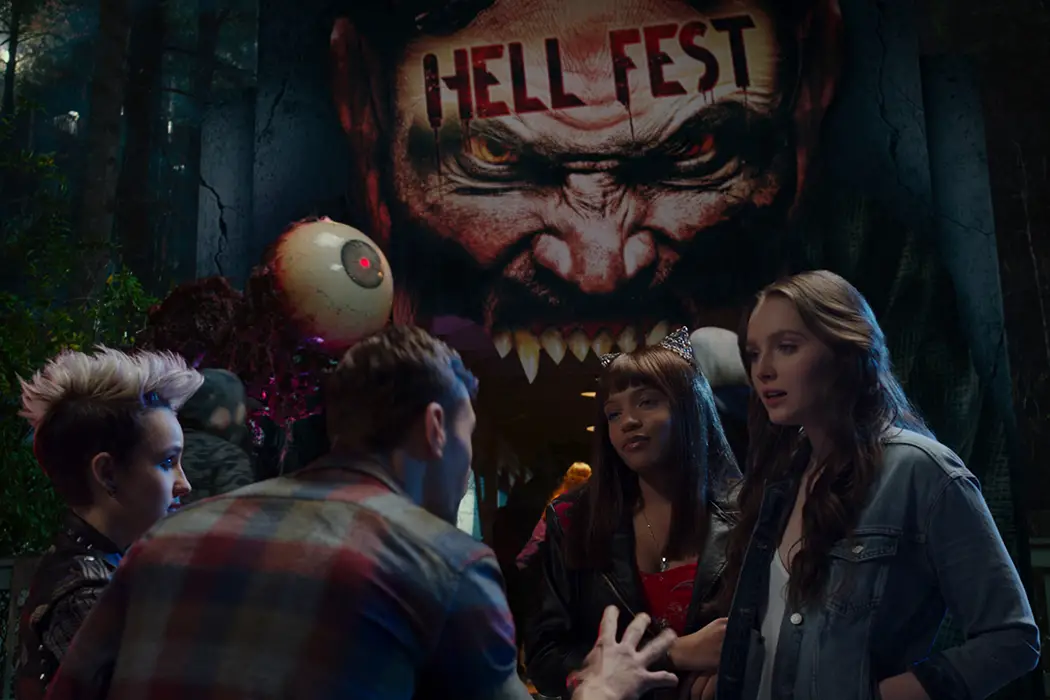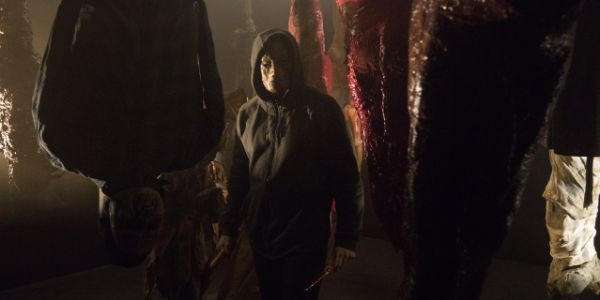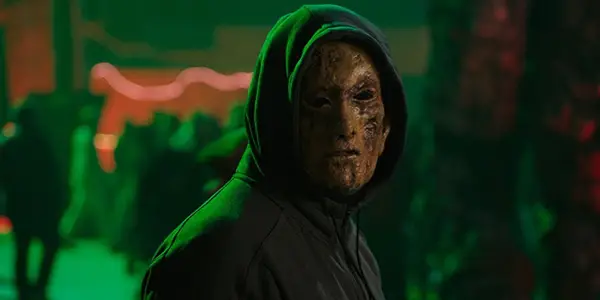HELL FEST: Innovative Concept Gives Way To Familiar Slasher Tropes

I'm a student at the University of North Carolina at…
About a month ago, I reviewed a film for Film Inquiry called Blood Fest. The (obviously) bloody project follows a group of horror movie fanatics who attend a traveling festival, only for things to go terribly wrong inside. I watched this goofy horror parody knowing full well that Hell Fest was coming down the pipeline shortly, and I always thought it’d be interesting to see how the two matched up.
In the latter slasher, directed by Gregory Plotkin, a bunch of bloodthirsty teenagers head to a traveling horror amusement park, only for a masked man to hunt them down one-by-one. So even if it’s not quite the same concept, it’s pretty darn close. Granted, there are a few major tonal discrepancies between the two films. Blood Fest was a sort of Cabin in the Woods-esque pastiche, frequently going for laughs and obnoxious self-referential nods over actual scares. This film is more of a straight-faced horror outing, drawing from the Michael Myers/Jason Voorhees tradition of the genre.
Despite those differences, the two films have one thing in common: they’re both extraordinary misfires. How does a movie that basically turns Universal’s Halloween Horror Nights into a slaughterhouse end up being so monumentally dull? With the exception of a few strong beats in the final third, Hell Fest is a waste of a perfectly fun idea, dragging the audience along for 89 minutes of tepid slasher tropes and a mind-boggling lack of actual substance.
Watching teens run around in elaborate mazes should never be this boring. But when pretty much every character is poorly defined, it’s easy to understand why nothing works here.
Nightmare In An Amusement Park
Amy Forsyth stars as Nat, a young college student visiting friends during the middle of a stressful semester. She’s pretty stressed from her classes, but she’s glad to reunite with Brooke (Reign Edwards), her best friend from childhood. Brooke is now living with Taylor (Bex Taylor-Klaus), a rowdy and spirited frenemy of Nat. Even though Nat just wants to decompress for a while, her best friend has planned a trip to Hell Fest, a horror park known for its shocking realism and relentless creepiness.

Excited for a night full of scares, our leads make the trip to the festival, along with Quinn (Christian James), Asher (Matt Mercurio), and Gavin (Roby Attal). The latter is responsible for snagging the tickets for their spooky adventure, but he’s also a potential love interest for Nat. They go along their merry way, taking shots and having a grand old time in the park.
But around the corner, something sinister is lurking. When Nat makes her way into a creepy maze, she witnesses a murder by a masked man. Since this is Hell Fest, she figures it’s a part of the show, even though it feels real. But that’s not the end of it. The same masked man is now following Nat around, which practically triples her paranoia. As the group splits up, some of them start disappearing. We see their untimely demises, but Nat is left in the dark. Soon enough, all hell breaks loose at Hell Fest, causing mass chaos and a brutal fight for survival.
Aimless Story Rehashes Old Clichés
One of my worst tendencies as a critic is to point out how many writers were credited on a bad movie; pitting the blame on a script-by-committee feels like a very reductive way to summarize a movie’s problems. But I can’t resist the temptation with Hell Fest, which apparently needed five writers to help craft the story (William Penick and Chris Sey) and the screenplay (Seth M. Sherwood, Blair Butler, and Akela Cooper). This is seriously confounding.

Why is it particularly shocking in this instance? Well, I only emphasize the crazy script credits because Hell Fest feels like a movie that was made without an actual script. The story is so bare bones it could have been ripped from any slasher movie of the last 50 years, and the dialogue is some of the stiffest I’ve seen in eons. In terms of the latter issue, when the immediate comparison point in my mind is Clint Eastwood‘s The 15:17 to Paris (which used non-professional actors to tell a story of great heroism), you know you’re in trouble. Hell Fest nearly feels like an attempt at improvisational horror, like director Plotkin just told his actors to go on set and wing it. Not a sound strategy.
In this case, maybe some of the blame should be shifted to the actors. But I honestly felt sorry for them more than anything, as it’s abundantly clear that nobody had anything to work with. If slasher movies require that we at least have some knowledge of who’s getting slashed, then this movie is a total failure. We’re barely given any amount of information about the relationship between Nat, Brooke, and Taylor to contextualize their squabbles, but the rest of the cast? Forget about it. They’re just there to die.
A Good Concept Wasted On Few Scares
Still, if Hell Fest delivered the violent goods in a memorably stylish way, I think most viewers would forgive its spotty choices in the characterization and dialogue departments. Those are secondary concerns for unabashed, B-movie fare like this, only made noticeable when the rest goes wrong. Indeed, the rest does go wrong in Hell Fest, mostly in increasingly drab ways.

For one, this is one of the more visually rote horror flicks I’ve seen in a long time. The color palette is flat and muted, even when the characters explore these kooky mazes (which theoretically should be filled with opportunities for invention). The cinematography is lacking in any expressive cinematic detail; it’s the rare movie where I imagine it’s worse to watch it on the big screen. And while Plotkin aims for Halloween-esque tracking shots of his masked killer, he adds nothing new to the equation. Even a final reveal about the murderer’s origins feels predictable.
Hell Fest: Conclusion
At an extreme minimum, Hell Fest does offer an inspired kill or two. Some of the violence is just plain cruel and nasty (I’m still not a fan of eye-related deaths, so it got me there), while other sequences generate a bit of tension. Emphasis on “a bit.”
Still, nothing offered by Plotkin and the numerous screenwriters gives the viewer any reason to get off the couch and cough up $10 for a ticket. In an age where horror options are plentiful this time of year, Hell Fest‘s derivative thrills almost feel insultingly disappointing. Here we have an ingenious concept told with no ingenuity, depriving viewers of even the baseline pleasures of the hack’n’slash genre.
Looking for gory chills as Halloween approaches? You won’t find them here.
What did you think of Hell Fest? If you also saw Blood Fest, which of the two did you enjoy more? Let us know in the comments below!
Hell Fest debuted in U.S. theaters on September 28. For full international release information, click here.
Does content like this matter to you?
Become a Member and support film journalism. Unlock access to all of Film Inquiry`s great articles. Join a community of like-minded readers who are passionate about cinema - get access to our private members Network, give back to independent filmmakers, and more.
I'm a student at the University of North Carolina at Chapel Hill. For 8 years, I've edited the blog Martin on Movies. This is where I review new releases, cover new trailers, and discuss important news in the entertainment industry. Some of my favorite movies- Casablanca, Inception, Singin' in the Rain, 2001: A Space Odyssey, The Wolf of Wall Street, The Nice Guys, La La Land, Airplane!, Skyfall, Raiders of the Lost Ark. You can find my other reviews and articles at Martin on Movies (http://martinonmovies.blogspot.com/).













